The aim of this post is to invite you to attend some of the talks/readings offered by the great literary event our town offers all its citizens. Great English-speaking writers are attending this event and I am sure that both bookworms and non would highly benefit from listening to them. It would give you a sense of achievement because, though the talks are translated into Italian, you can still listen to the writer and somehow practise your English. Then it is a great opportunity listening to topnotch and world-renowned writers, an opportunity I did not have at your age. If you want to get a taste of the authors who are coming to Pordenonelegge, click here, Ms. Cimetta created an interesting post for us all.
The cob, symbol of this year’s Pordenonelegge, may symbolize the love for reading lots of us share. Let’s have a taste of this together by getting to know one of the writers I am personally eager to listen to and read and hope you will like too.
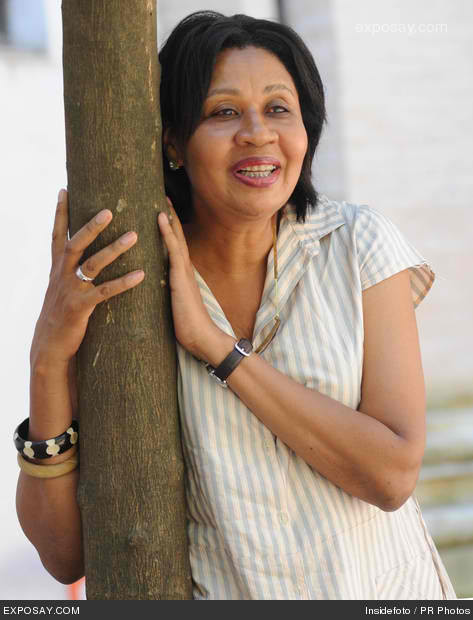
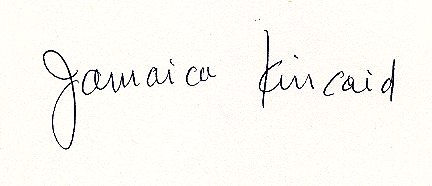 September 21st, Piazza San Marco, 17.30
September 21st, Piazza San Marco, 17.30
Watch the following video about Jamaica Kinkaid created by a student. Since the audio may not be clear enough for you to understand it, follow the guidelines below which may somehow help you focus on the most relevant aspects of the author’s life and background.
- Country and date of birth
- Events that left a mark in the relationship with her mother
- Consequences of her job experience as an au pair in the USA
- “Thought it always existed and always will” (What does she refer to?)
- Major themes of her works
- Success as a writer
- Her life now
Do you agree or disagree with the following statements?
- It is easier to be a girl than a boy in this world.
- Gender roles are pretty similar no matter what place you come from.
- Gender roles are pretty similar from generation to generation.
- Race plays a part in the way you are supposed to act.
You are going to read a text called GIRL, included in the anthology The Story and its writer: an Introduction to Short Fiction, 2003. The context is Antigua in the 50’s.
- While reading, think of possible answers to the following questions:
-Who is speaking? To whom?
-Why don’t either of these characters have names?
-Is the girl really “bent on becoming a slut” or is that just her mother’s fear?
-Is the daughter listening to any of this?
You can read an annotated digital version of the tex by clicking here or you can download the following pdf document. It is up to you. If you wish, you can also listen to it, click here.
-What intrigues you about this story?
-What catches your attention?
- Spot the following themes, ideas and arguments in the text and highlight them in different colours:
1. mother-daughter relationship
2. cultural rules and expectations
3. stereotyping of women; what does it mean to be a “slut”?
4. sex roles for men and women, boys and girls
5. colonialism: how might the characters be affected by living under British rule?
6. folk remedies (“a good medicine to throw away a child…”) versus Western medicine
7. superstition
8. assimilation (playing by the rules versus challenging/changing them)
-Do you identify with the girl in this story? Why?
-If you are female, what experiences or advice helped you become a young woman?
-If you are male, what experiences and advice do you think helped your sisters, girlfriends to become women?
-If you could interview the writer, what questions would you ask her?
Now watch an interview by a Time Magazine journalist and make notes on some extra information about the author and her themes.
If you attend the event on Sunday, pay attention and write down the questions Jamaica Kinkaid will be asked during the interview. 🙂
These two quotations may add to your curiosity of getting to know a bit about this writer.
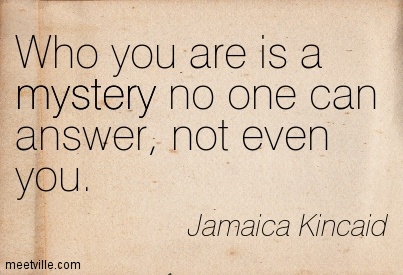
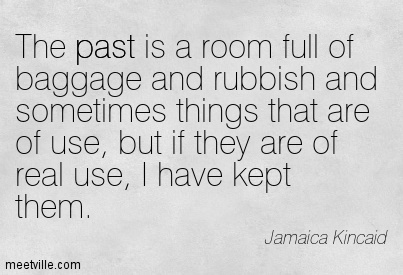 Activities devised by Laura Cimetta, Cristiana Ziraldo “Liceo Grigoletti” & Nella Maccarrone “Liceo Leopardi-Majorana”.
Activities devised by Laura Cimetta, Cristiana Ziraldo “Liceo Grigoletti” & Nella Maccarrone “Liceo Leopardi-Majorana”.
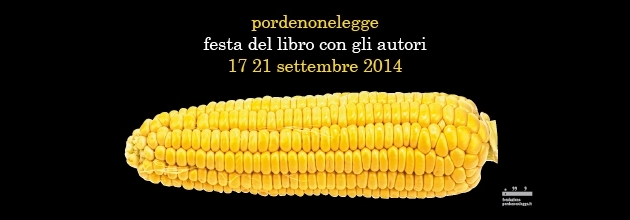

My compliments on your great collective work on Jamaica Kincaid! I enjoyed reading and exploring it. I learnt a lot from it and I look forward to reading your students’ work.
Splendid, thank you for sharing your ideas and see you at Pordenonelegge!
I remember helping one of my students read this several years ago. He went to Kennedy High: is there a chance you were his teacher? I don’t know many aside from you (directly) and Ms. Cimetta (through word of mouth), but I’m sure very few would assign this type of literature to students nowadays, which is a shame. I really enjoyed that hour of my life, though I must admit I was lazy enough to not go read other works by the author. I hope I can swing by at the talk.
Nice article, by the way.
I’ll see you around!
🙂 Do not know the student your are referring to. However, Laura, Nella and I decided to deal with this writer because we wanted to promote the English-speaking authors invited to Pordenonelegge. We had fun working together. We are not only colleagues, we are friends too so this makes things easier. For us getting together and working together is a real treat!
JAMAICA KINCAID
1) Are you inspired by some authors in your works?
2) Are your books autobiographical?
3) What do you think about modern authors? Do you know italian authors, too?
Questions I would like to ask to Jamaica Kincaid:
– Do you think racism will last forever?
– What do you think about being a woman, but in another country? Do you think it would be different to you?
– Why do you think that neither ourselves know us for real? (“Who you are is a mistery no one can answer, not even you”)
– Do you think that you would have become a writer as well if you were a boy?
– Do you think some people alienate themselves because they want to, or because other people impose them to?
– Would you prefer to be an only-child? Why?
– Do you think the past is useful or useless for ourselves?
– Do you think that will always exist differences between male and female?
– How do you take inspiration for the books you write?
– Have you ever thought about writing an autobiography? Do you believe it would help other people, reading it?
I’ve listened to Jamaicas Kincaid’s interview and tryed to compare it to what we did and found out today in class and than I’ve searched for more informations on my own because I was interested in this incredible writer’s life and opinions. Then I prepared my questions:
1. We know that one of the most frequent themes of your books is the mother-dauther relationship and it’s simple to reconnect it to the difficult relationship you had with your mother, but how much of this is autobiographic? There are in your books parts of your life or personal experiences?
2. It is known that you had a difficult relationship with your mother over the birth of your brothers, but how was your relationship with them? How is it nowadays? Were you envious of their opportunities?
3. You are a famous and multi-award writer, have you always loved to write or have you started writing to communicate your point of view and opinions on colonialism?
4. The fact that you have become a writer and you write about cultural rules and expectations, colonialism and family relationship had a negative or positive impact on your family life? What was your mother’s opinion?
5. I absolutely love your phrase about the past (“The past is a room full of baggage and rubbish and sometimes things that are of use, but if they are of real use, I have kept them.”), I think there are a lot of interpretations and things it can be referred. What is your personal interpratation? When did you write it? It refers to something specific?
6. At last, I want to ask you if you have some regrets or there’s something of your past you would change.
I am so happy, Anna, that you decided to read more about Jamaica Kincaid. This was the purpose of the activity: promoting reading, inviting young people to develop an interest for reading. Well done. 🙂
These are the questions I would ask to Jamaica Kincaid:
1)How old were you when you first started writing?
2)What does it mean for you to write?
3)What led you to become a writer?
4)What is your favourite literary movement?
5)What is your favourite book?
6)What is the message you want to spread with your books?
Questions for Jamaica Kincaid:
1. What gives at her the experience of work as a opear? what are the negative and positive aspects in this experience?
2. In which way the writing helped her?
3. What are the messages that she would like to give at the poeple?
4. What are the concepts with which she has grown, in despite of the background that surraunded her?
5. Does she thinks that the real inspiration for becoming a writer was the experience she has lived or she thinks that she would gone down this road anyway?
The questions are interesting, but they are not completely clear. There are spelling and grammar mistakes that somehow spoil the “quality” of the question. 🙁
Questions to the writer Jamaica Kinkaid:
1. What do you think people may find in your books?
2. What symbolizes for you writing?
3.What prompt you to become a writer?
4. We understand, also with your books, that the relationship with your mother weren’t so good. So what do you feel towards her? Were you able to understand some of your mother’s behaviors growing up, as an adult and a mother?
5.How is the relationship with your children? Are you a strict mother?
6.I really like a sentence that you asserted during an interview: “I like to pretend to be alone in the world”. Is this research of feeling part of your personality or is it lead to the fact that when you were a child you were often alone?
7.In your opinion what kind of consequences has colonialism in the world?
8.In one of your interview you said that “one of the terrible things that feminism never addressed is the moral situation: women always wanted to do the things that men do, but so many of those things are impulsive and shouldn’t be done at all ”. So what you think about equality? Do you think it’s better not reaching that?
9.Are you agree or disagree to the fact that some religions in the world impose hard social and behavioral impositions and rules to women? What do you think about that?
10.What would you do to improve the women’s situation nowadays? And their rights?
11. Are you a dreamer? What your biggest dream in life?
I like all your questions, but in particular questions 7 to 8. We need to reword them though.
What consequences has colonialism had in the world?
In one interview you said that “one of the terrible things that feminism never addressed is the moral situation: women always wanted to do the things that men do, but so many of those things are repulsive and shouldn’t be done at all ”. So what do you think about equality? What does it consist of? What does it imply?
Do you agree or disagree with the fact that some religions in the world impose harsh limitations and restrictions upon women?
I would like to ask her these questions:
1- How did you feel when you moved to New York?
2- What helped you to overcome the isolation, alienation in New York?
3-How did you feel when your first book was published?
4- Which advices you recommend to your sons after your experiences in life?
5- How is the relationship between you and your mother after your success in life?
Any mother happens to give advice to their children. I think your mum does the same with you. So qeustion 4 is too generic. Perhaps you wanted to say something else. Let’s see whether I interpreted your thoughts correctly: “Your life experiences have certainly forged you into the woman you are now. What pieces of advice as a mother did you feel the urge to give to your children?” A bit long-winded, I know, but I could not come up with a shorter interpretation! Sorry 😉
These are the things that I would like to ask at Jamaica:
1. What inspired you to become a writer? To become a writer has always been one of your dreams or a passion or a gift that you have discovered during life? And if you have discovered it, at what age?
2. When and in what way was born your success? With the help of whom?
3. What is your favorite writer? And what is the book that you recommend to your readers?
4. What was your first book?What inspired you to write it?
5. Your family has always support you?
6. Which of your books do you mostly love? Why?
7. Are you still in contact with your brothers? If yes, what kind of relationship have you with them? And in the past?
8. If you could change a thing in your life,what would you change?
9. How and when did the love between you and your husband born?
10. When you were a young woman,did you ever fall In love with a white guy?
11. In your text “Girl”, why the mother that is talking to her daughter thinks that if her daughter does not follow her advices will become a “slut”? And why she thinks that her daughter is on the road to become it?Your mother thought at the same way of the mother of the text ?And you?
12. What inspired you to write “Girl”?
Alexia.
These are my questions:
1. Why did you decide to have an experience as an Au Pair?
2. Has your mother ever told you the recommendations that you wrote in the short story “Girl”?
3. What is the favourite book you’ve written?
4. How old were you when you started writing?
5. What inspired you to write your first book?
I love question 5. I would love you to ask her this question, because I would love to know the answer to it!!!
My questions to Jamaica Kincaid:
1. What did you think when your mother gave you some advice for “how to be a good woman”?
2. How is the relationship with your mother now? And with your brothers?
3. How you felt during colonialism and Jim Crow Law?
4. Your experiences helped you become a woman? Did they influenced you in a positive or negative way?
If you were asked the fourth question, how would you personally answer this question? It is not easy at all and it implies being a very balanced person.
My questions to the writer:
1) What would you have done if you couldn’t work as an au-pair in America?
2)Why there were prejudices against women?
Why were they considered less competent than men?
3)How was the relationship between you and your mother when you became an adult?
Did you feel always alienated or did something change?
If you had not become a writer, what do you think you would do now?
Why were there perudices against women when you were young? How have they changed over the years?
I would like to ask Jamaica Kinkaid these questions:
1_ How old were you when you decided to write your first book?
2_ How is the relationship with your mother now?
3_Was your first book immediately published or did you have to try many times or to rewrite it?
4_Did you do something else besides writing novels to carry forward your ideas about women rights?
5_Was your experience as an au pair girl more positive or more negative?
6_What message would you give to the women that are still submitted or without rights?
Wow, great questions Laura. I love question 3 because it emphasises an aspect your classmates did not underline: you do not become a writer overnight, you need to work hard, you need to edit your work over and over again, and most of all you need to overcome lots of “blue” moments, especially when editors do not accept your novel or think it is not worth being published.
Questions to Jamaica Kindkaid:
1. Had your mum ever told you that you were a good writer?
2. When did you understand you had the talent of writing?
3. What was the first book you read?
4. In your text, “Girl”, are you the daughter and is the mum your mum?
5. How do you feel when you write stories telling your personal experience?
6. Did you always do what your mum told you?
7. How was your relationship with your brothers?
Chiara, these are superb questions! Well done. I am always very proud of you! So lovely to have you in class. Can I clone you? 🙂 (said jokingly, obviously!!!) You are always working very hard and I can see the results. Just one point, you say “talent for”.
questions for Jamaica Kincaid
1.Is your mother proud of your success as a writer?
2.Becoming a writer has always been your dream?
3.Are all your books autobiographical?
4.Are you happy about your books or would you like to change something?
5.Do you write your books by yourself or somebody helps you when you need help?
I like question n. 5, because it emphasises the fact that writing is not necessarily a solitary activity, but it can also be collaborative.
the question i would like to ask her are:
1) Are you angry with your mother with the fact that when your brothers were born, your relationship with her were changing?
2)when you finish to write a book, are you proud of it?
3)when you are writing a book and you are thinking about the main character, how are your fellings? Are you angry or what?
4)do you have a good relationship with your brothers?
Are you angry with your mum because she changed her relationship with you when your brothers were born?
When you are writing a book, what are your feelings? Do you feel angry or what?
When did you discover your passion as a writer?
How did you feel when you sold your first book?
Why did you base the plot of your books on a sad theme like colonialism?
Why did you decide to become a writer?
Nice personal questions, especially the second one. Well done
1. Why did you decide to become a writer?
2. When did you understand that this would be your future job?
3. What have you sacrifice to become what you are now?
4. Do you think that in your books you write things that you would like they to happen to you?
Is there anything you had to sacrifice in your personal life to embark on a career as a writer?
Do you write in your books things that you would like to happen or wish had never happened in your life?
These are the questions I would like to ask Jamaica Kincaid
1 Why did you decide to write a book ?
2 Did your family ever read your book? If yes what did they think about it ?
3 How did you deal with everything that happened to you?
4 Are you satisfied with your work ?
5 what does your husband think of your books and your past?
My questions are:
1. Did your mother change your life?
2. Did she treat you as you wrote in the story “Girl”?
3. Did you rebel against your mother?
4. Did your mother behave with your brothers in the same way she behaved with you?
These are my questions to Jamaica Kincaid:
1) How did you discover your vocation for writing?
2) Did you start writing for pleasure or you felt the necessity of that?
3) Is there anything particular your mother taught you, that you want to thank her?
The questions I would like ask her:
1)Are you the daughter in the poem “GIRL”?
2)Why you decide to become a writer? Has approved your family that you became a writer?
3)How was the family in which you worked? The relationship between mother and daughter was the same as yours?
4)What is your relationship with your children?
5)Since you went away, have you ever heard someone of your family?
6)Have you found difficult to publish your first book?
Questions:
1.-You’ve never experienced the desire to rebel against your mother when she told you that you would become a slut if you didn’t do certain things and if you hadn’t behaved in that particular way?
2.-When your mother sent you to New York at the age of 16, did you felt rejected by her? If yes, how did you learn to live with this feeling?
3.-In your video you say that your “new mother” was a very kind and generous person, while your biological mother was a persone more “rude” and realistic. Have you ever wished that your real mother was the one in NY and not your biological mother?
4.-How was your experience in New York? At the end you managed to integrate yourself or you continued to feel alienated by what surrounded you?
1- After the period in New York working as Au Pair, how was the relationship with your mother?
2- Do you mantain the relationship with your brothers, or had you never spoked with them?
3-There is someone or something that inspire you to write your books?
4- Did you know since you were small, that you would become a writer? Or is it an idea that came after New York?
I would to know the answer to your fourth question too: When you were a child did you want to become a writer? When did you start thinking of becoming one?